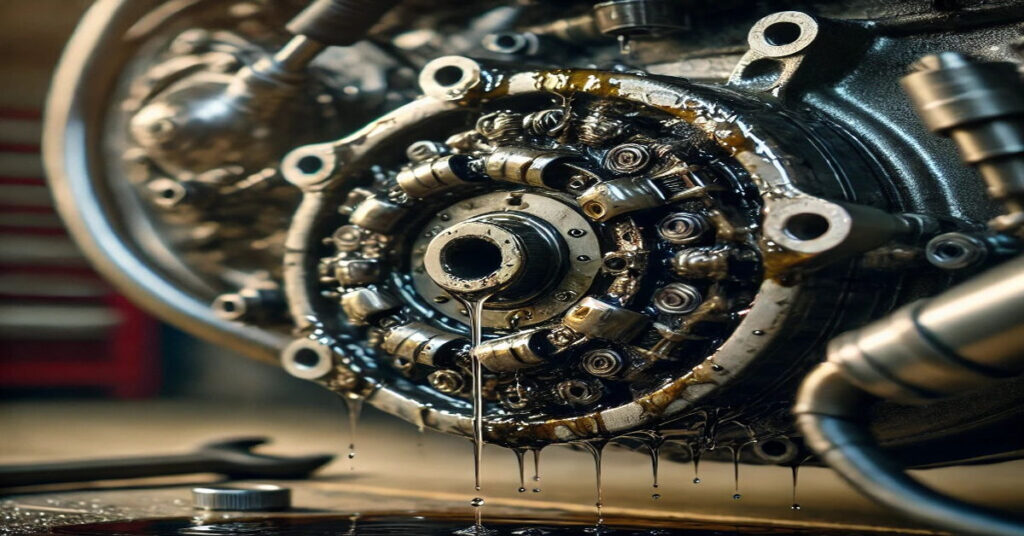Motorcycles are incredible machines designed for an exhilarating riding experience. They consist of numerous components, each working in harmony to ensure optimal performance. However, when it comes to maintaining your motorcycle, one common concern often arises: the impact of oil levels on the clutch system. Specifically, can too much oil cause clutch slip in motorcycles? Let’s explore this issue in-depth, uncovering the relationship between engine oil levels and clutch performance.
Understanding the Basics: What is Clutch Slip?
Before delving into the relationship between oil and clutch performance, it’s essential to grasp what clutch slip means. In simple terms, clutch slip occurs when the clutch plates fail to engage properly, leading to a loss of power transfer from the engine to the wheels. This results in reduced acceleration and can make the motorcycle feel sluggish or unresponsive.
Symptoms of Clutch Slip
Recognizing the signs of clutch slip is crucial for any motorcycle rider. Common symptoms include:
- Loss of Power: You may notice that the engine revs up without a corresponding increase in speed.
- Slipping Gears: The bike may have difficulty holding a gear, resulting in unintended gear changes.
- Unusual Noise: A grinding or whining sound might be heard when attempting to accelerate.
- Increased Engine RPM: The engine may rev higher than usual without a proportional increase in speed.
If you experience any of these symptoms, it’s vital to address the issue promptly.
The Role of Oil in Motorcycle Functionality
Motorcycles operate with an engine oil system that plays a pivotal role in various functions, including lubrication, cooling, and cleaning. The oil helps reduce friction between moving parts, ensuring smooth operation. However, an optimal oil level is crucial to maintain this balance.
Oil Types and Their Functions
Motorcycles generally use two types of oil: engine oil and transmission oil. In some motorcycles, both oils are combined in a single oil system, while in others, they are separate. Understanding this distinction is essential when considering how too much oil can impact clutch performance.
- Engine Oil: This oil lubricates the engine components, reduces wear, and helps maintain optimal operating temperatures.
- Transmission Oil: This oil lubricates the transmission and clutch components, ensuring smooth gear shifts and preventing wear.
How Too Much Oil Can Lead to Clutch Slip
Now that we understand the basics of motorcycle oil systems, let’s dive into how an overabundance of oil can result in clutch slip.
Oil Contamination
One of the primary ways too much oil can lead to clutch slip is through oil contamination. When the engine oil level is excessively high, it can leak into areas where it shouldn’t be, including the clutch assembly.
How Does This Happen?
- Overfilled Oil Reservoir: When you pour too much oil into the engine, the excess oil can overflow into the crankcase, which can lead to leakage into the clutch area.
- Slippery Surface: Once oil seeps into the clutch assembly, it creates a slippery surface on the clutch plates, preventing them from gripping properly. This results in clutch slip, leading to poor performance.
Increased Pressure
Overfilling engine oil doesn’t just lead to contamination; it also raises pressure within the oil system. This excess pressure can force oil into areas where it shouldn’t go, including the transmission and clutch system.
Implications of Increased Pressure
- Oil Leakage: The increased pressure can cause seals and gaskets to fail, leading to leaks that further exacerbate the contamination issue.
- Clutch Plate Dysfunction: With too much oil present in the clutch assembly, the plates may not engage effectively, leading to clutch slip and reduced power transfer.
Heat Generation
Excessive oil levels can also lead to overheating. When there is too much oil in the system, it may not circulate efficiently, causing the engine to run hotter than normal.
Consequences of Overheating
- Deterioration of Clutch Components: High temperatures can cause clutch components to warp or degrade, further contributing to clutch slip.
- Oil Breakdown: Overheating can break down the oil itself, reducing its lubricating properties and increasing the likelihood of clutch issues.
Preventing Clutch Slip: Tips for Proper Oil Maintenance
To prevent clutch slip caused by too much oil, it’s essential to maintain proper oil levels in your motorcycle. Here are some practical tips for ensuring optimal oil maintenance:
Check Oil Levels Regularly
Regularly checking your oil levels is a straightforward yet effective way to prevent overfilling. Always follow the manufacturer’s guidelines for the recommended oil level and check the dipstick to ensure accuracy.
Use the Right Type of Oil
Make sure you’re using the correct type of oil for your motorcycle. Different motorcycles have different oil specifications, and using the wrong type can lead to performance issues. Always consult your owner’s manual for the recommended oil type and viscosity.
Change Oil Regularly
Regular oil changes are crucial for maintaining optimal performance. Over time, oil can become contaminated with debris and lose its lubricating properties. Follow the manufacturer’s recommended oil change intervals to ensure your motorcycle operates smoothly.
Be Mindful During Oil Changes
When changing the oil, be cautious not to overfill the reservoir. Pour in small amounts and check the level frequently to avoid excess oil. If you accidentally overfill, drain the excess oil immediately.
What to Do If You Experience Clutch Slip
If you notice signs of clutch slip in your motorcycle, it’s essential to take action promptly. Here are some steps to follow:
Inspect the Oil Level
Start by checking the oil level. If it’s higher than the recommended level, you may need to drain the excess oil to prevent further issues.
Look for Oil Leaks
Inspect the clutch assembly and surrounding areas for signs of oil leaks. If you see any leaks, it may indicate that oil has contaminated the clutch system.
Seek Professional Assistance
If you’re unsure about the source of the problem or how to resolve it, consult a professional mechanic. They can provide an accurate diagnosis and recommend necessary repairs.
Conclusion
Can Too Much Oil Cause Clutch Slip in Motorcycles, particularly in models with a shared oil system for the engine and transmission. Oil contamination, increased pressure, and overheating are key factors contributing to this issue. By understanding the relationship between oil levels and clutch performance, motorcycle owners can take proactive measures to prevent problems and maintain optimal performance.
Regular oil checks, using the right type of oil, and adhering to maintenance schedules are crucial in ensuring your motorcycle runs smoothly. If you experience clutch slip, taking prompt action is essential to avoid further complications. By staying informed and attentive to your motorcycle’s needs, you can enjoy a safer and more enjoyable riding experience Can Too Much Oil Cause Clutch Slip in Motorcycles.







